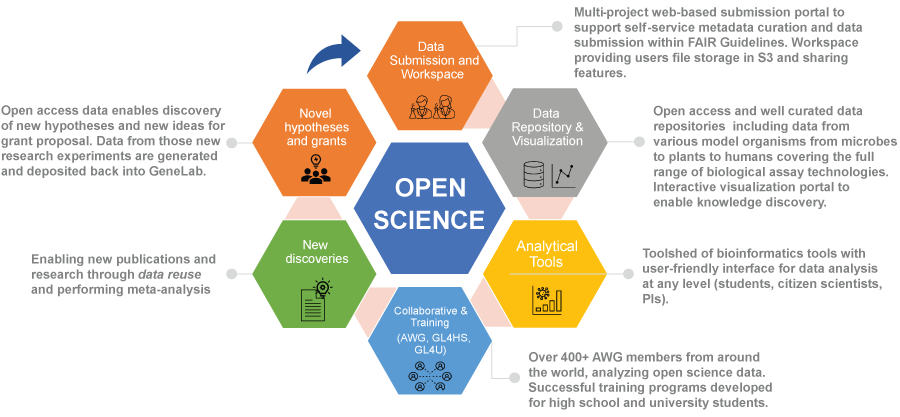Open Science Data Initiatives
The ethos of Open Science lies in the belief that broader access to meticulously curated scientific data will contribute to a richer accumulation of knowledge. All space-related biological research data are precious national data resources.
The NASA Open Science and Open Data initiatives are designed to help scientists discover and access datasets to perform primary, secondary, and meta-analyses. The progressive movement of this Open Science model maximizes scientific results from NASA funded research data and encourages community participation in the formulation of investigations, collection of tissues, and dissemination of data.

These initiatives are aligned with NASA's efforts to implement the "FAIR" principles to ensure all data are:
- Findable - consistent and persistent descriptions make scientific data easy to find by both humans and computers
- Accessible - use of standard, open protocols ensure data and metadata can be accessed by all
- Interoperable - formal, accessible, and widely adopted semantics and vocabularies are used to expand data usability across systems and communities
- Reusable - data are richly described according to standards to ensure they can be combined or replicated, and usage rights are clarified
The FAIR principles have been implemented in the Open Science Data Repository, with the goals of increased collaborative scientific data sharing and analysis and more rapid scientific advancement. With a suite of open science repositories, Space Biology offers open access to data and tissue repositories where researchers archive and share their research outputs, such as datasets, tissue derivatives, images, and videos.
Space Biology's Open Science Projects include:
- Ames Life Sciences Data Archive (ALSDA)
- GeneLab
- NASA Biological Institutional Scientific Collection (NBISC)
- Space Biology Biospecimen Sharing Program (BSP)
The Open Science Projects are committed to the full and open publication of scientific data obtained from NASA Space Biology funded grants. The Open Science Projects provide timely and ongoing delivery of research and mission data by providing guidance, protected workspace, and storage to assure this goal.





